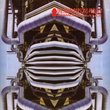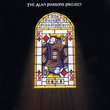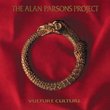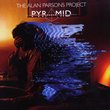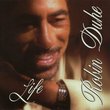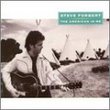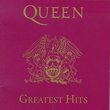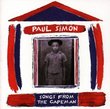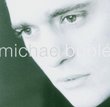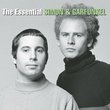| All Artists: Alan Parsons Project Title: Stereotomy Members Wishing: 3 Total Copies: 0 Label: Arista Release Date: 10/25/1990 Genres: International Music, Pop, Rock, Classic Rock Styles: Europe, Britain & Ireland, Soft Rock, Vocal Pop, Progressive, Progressive Rock, Album-Oriented Rock (AOR) Number of Discs: 1 SwapaCD Credits: 1 UPC: 078221838429 |
Search - Alan Parsons Project :: Stereotomy
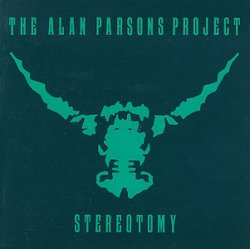 | Alan Parsons Project Stereotomy Genres: International Music, Pop, Rock, Classic Rock
Japanese-only SHM-CD (Super High Material CD) paper sleeve pressing of this album. SHM-CDs can be played on any audio player and delivers unbelievably high-quality sound. You won't believe it's the same CD! Includes the sa... more » |
Larger Image |
CD DetailsSynopsis
Album Description Japanese-only SHM-CD (Super High Material CD) paper sleeve pressing of this album. SHM-CDs can be played on any audio player and delivers unbelievably high-quality sound. You won't believe it's the same CD! Includes the same bonus tracks that appear on the EU/US expanded editions. Sony/BMG 2009. Similar CDs
Similarly Requested CDs
|
CD ReviewsIt'll blow your stereo... Humberto Mejia | Perth, Australia | 08/25/2007 (4 out of 5 stars) "Luis Mejia (son) - Stereotomy, released in 1985, marked a further and better inclinnation into echoing rock with a brand new synthesized style, combined with the best natured modern arrengements. Released after the pop-like, mellow Vulture Culture, Stereotomy kept a strong synth rock based structure, although it was the album which breaked their "trillogy of best sold albums" mainly because of the more difficult sound and because of Woolfson small vocal contribution, as Woolfson voice was very commercial. Stereotomy is mainly a futuristic, synth rock album, being mainly structured with modern synthesized mellodies and a rock basis, its styles differ from synth rock, prog and power ballads. Its thoughtful, personal and critisizing lyrics assume one of their most strong and questioned compositions, just as another reviewer mentioned, if you listen carefuly to the album and compare it with the band's later destine, it really sounds like deja-vu writings, almost with a subliminal message of the band's fate. Stereotomy possesses catchy, electronic, powerful, aggressive, urban, modern and futuristic moods. Even though it stays as a much more aggressive album, its awkward use of modern keyboards, the much lesser impact of the album, the poor sales, its lack of evocative material and its uninspired cohersion makes Stereotomy the worst of TAPP albums, but still is a nice work. Some of the songs make it a memorable album, still the cohersion in the whole album stays awkward, but still there is a group of songs that keep Stereotomy a fine work: the title track Stereotomy gives to the album a great potential and hope, its echoing performance, plus its imaginative and serious lyrics are fantastic; although the song is sang by John Miles, it possesses Eric Woolfson only vocal feature. Then comes the famous, beautiful, sentimental and recognizable power ballad Limelight, sang by Procol Harum's Gary Brooker, it has a sincere touch of the dream and comfort of every artist in rising fame, its the second best song in the album, while the electric, futuristic and catchy instrumental Where's The Walrus? is a valueable and memorable song. Then comes Light Of The World, while not having a powerful style or too much of fantastic mellodies, its the only song where Parsons bring back his classic style, being an emotionally powerful and light, uncompromising, unexagerated arrengements and mellodies, it remains as a mixture between I Robot's Breakdown and The Turn Of A Friendly Card's Nothing Left To Loose, certainly being the most recommendable song in the album. The other tracks are also good but not as impressive as the others, like the light, funny and catchy Beaujolais, the interpretations of both the smooth and stressful side of the city in Urbania, the rocker In The Real World, the slight ambient effort of Chinese Whispers, which connects with the fierce but unnecessary Stereotomy Two. Track Pick: Stereotomy, Limelight, Where's The Walrus?, Light Of The World. The artists performance is also great but Alan Parsons' keyboard usage at one point gets stressful, while Eric Woolfson only sang one fragment of a song, and this kind of dissapoints me because he is one of my favourite vocalists. Andrew Powell's orchestral arrengement is the most poor of all of his arrengements, I only noticed a slight string performance at some point of Where's The Walrus?. The vocalists in the album include Chris Rainbow, Gary Brooker, John Miles and Graham Dye. In conclussion I regard Stereotomy as their worst album, although its still well crafted and with a serious/somber composition, it finds its way to appreciation though, just like they say, as music isn't written in words, sometimes the message can't be correctly comprehended." A nice try...rocks, but lacks a strong central theme...life Alan Holyoak | In the shadow of the Tetons | 02/15/2008 (3 out of 5 stars) "Stereotomy is The Alan Parsons Project's (APP) 9th album. It was released near the end of 1985, not all that long after a calmer, more characteristic concept album - Vulture Culture.
Anyway, if you are an APP listener, you know that their music swings from etherial instrumentals and mellow ballads to driving techno-rock. This album presents more of the latter. The tracks "Stereotomy", "Stereotomy Two", "Beaujolais", and "In the Real World" all have a clipped, strong techno-rock sound, though sometimes cacophonous, and therefore, not among my personal favorites. "Urbania", on the other hand, is an outstanding progressive rock instrumental, and well worth a listen. The other instrumentals, "Where's the Walrus" and "Chinese Whisper" seem uninspired. In fact, in my opinion, "Chinese Whisper" (at only 1 min long) is little more than a preamble to "Stereotomy Two." I don't quite know what to make of "Light of the World". The song is a passable, though certainly not a memorable mellow offering. On the other hand, I find "Limelight" to be HIGHLIGHT OF THE ENTIRE ALBUM! It is one of the few songs on this disc that reminds me of what I like best about APP. I know that different people have different opinions and tastes when it comes to anything, but I don't see how this album rates more than about 3 stars. The two best tracks in my opinion - "Limelight" and "Urbania" don't salvage the rest of the album. If you have not listened to APP before, I recommend giving this album a miss, for the time being, and start out with "Tales of Mystery and Imagination", "I Robot", "Turn of a Friendly Card" or even "Vulture Culture" for a taste of APP's best. This album, except for a couple of songs, seldom finds its way to my playlists. From a 30+ year APP listener." |

 Track Listings (9) - Disc #1
Track Listings (9) - Disc #1